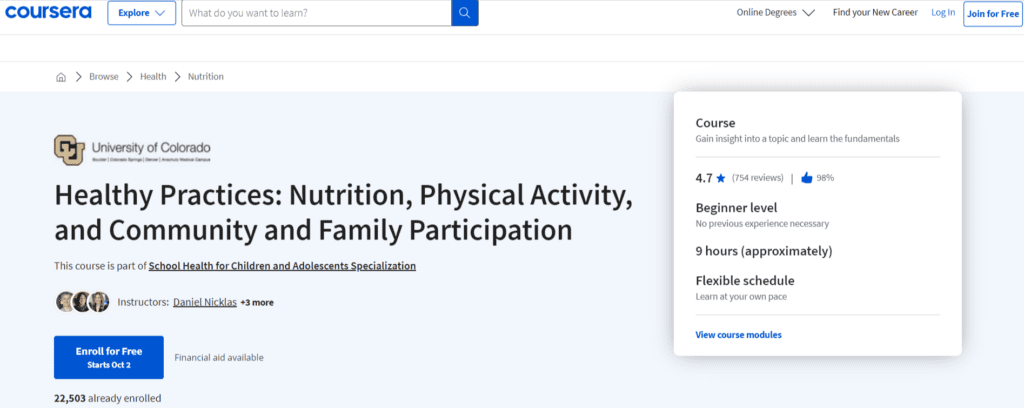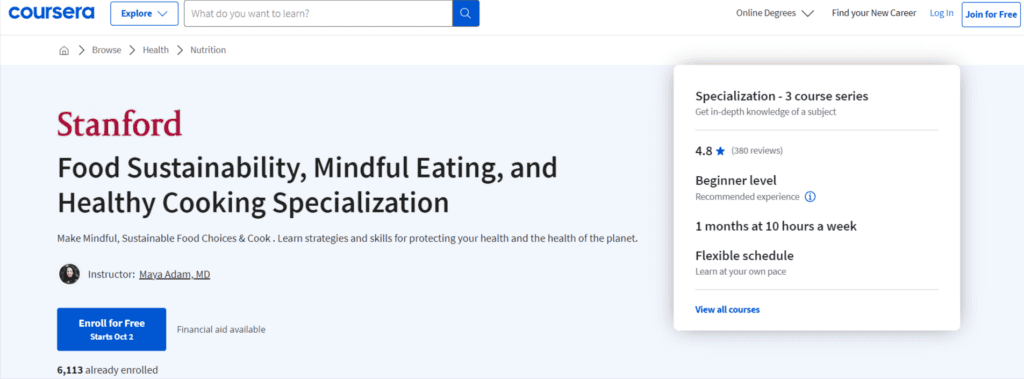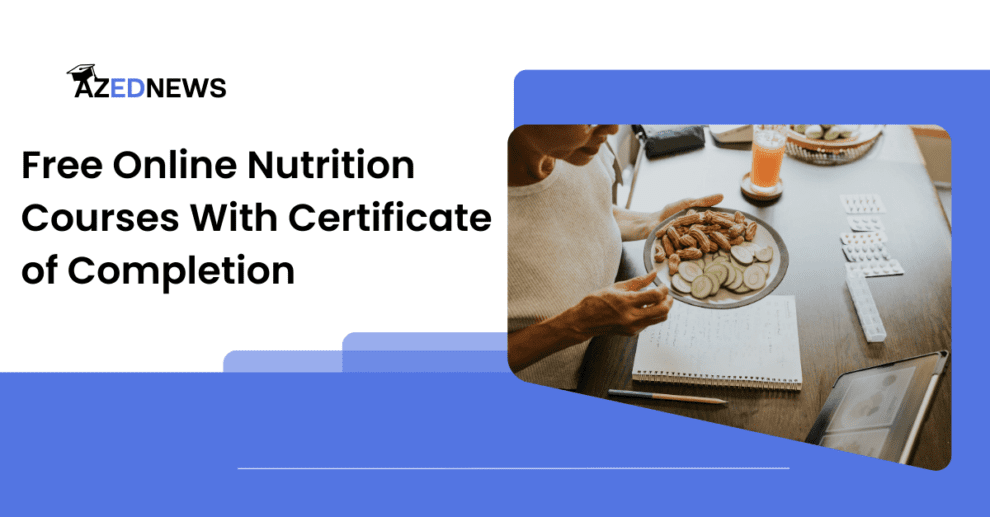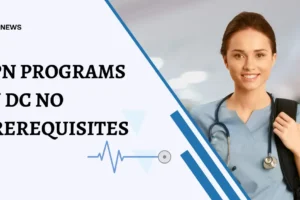If you want to advance your nutritional career, free online nutrition courses with certificate of completion will be valuable resources for you. By doing these courses, you can gain new knowledge and skills, leaving you better equipped to help yourself and others make informed decisions about their diets.
Table of Contents
Nutrition is of great importance in our fast-paced modern society, but it is not very easy to navigate the vast area of nutrition information. But, these free online nutrition courses may be a solution that typically covers a wide range of topics, including fundamental nutrition principles, dietary guidelines, meal planning, and the effects of nutrition on health. If you are looking to do a PhD in nutrition, you can check our detailed article on the best grants available for a PhD in nutrition.
Explore 8 free online nutrition courses with certificate of completion that can expand your understanding of this important aspect of health.
Key Takeaways
- You can learn about nutrition for free online and get a certificate.
- There are courses for beginners and some teach how to cook healthy meals.
- These courses cover what to eat to be healthy and how food affects your body.
- You can learn about different diets, like vegetarian or weight loss.
- There are even courses about careers in nutrition.
Top 9 Free Online Nutrition Courses With Certificate of Completion
1. National Academy of Sports Medicine Nutrition Essentials
You should consider taking this Coursera course on food nutrition, which covers the basic principles of nutrition and how to use them to help clients reach their fitness goals. Through informative videos and entertaining quizzes, you will learn about macro and micronutrients, energy balance, and how to create a balanced meal plan.
Sign up for these free online nutrition courses with certificate of completion. These courses will teach you how nutrition can influence your body’s structure and function. If you’re a fitness professional looking to expand your knowledge in this area, these courses are a great choice.
Enroll – Link
2. Healthy Practices: Nutrition, Physical Activity, and Community and Family Participation

This is a certification program in holistic nutrition for beginners. Through this course, you will learn innovative concepts from subject experts. Additionally, through practical projects, you’ll gain a basic understanding of a subject
which can help you develop skills you can apply in the workplace.
In this free online nutrition course with certificate of completion, you will also learn about nutrition and exercise.
3. Food Sustainability, Mindful Eating, and Healthy Cooking Specialization

This Coursera-listed free online nutrition course from Stanford may be an ideal option for you. You’ll learn how to eat in a way that promotes your health and the health of others in this nutrition course. Additionally, you will learn how to be an environmentally sensitive consumer.
These free online nutrition courses with certificate of completion will guide you in enhancing your eating habits and fostering a healthier relationship with food. By acquiring the skills to cook with a principle-based approach, you can ensure a healthier body through these courses. The course content will equip you with a comprehensive grasp of nutrition concepts.
4. Nutrition: Short Course (Beginners)
This is a great free online nutrition course for beginners. You will learn the fundamentals of living a healthy lifestyle in this course. Thanks to the flexible course schedule, even the busiest person will be able to start and finish the course at their own pace.
In these free online nutrition courses with certificate of completion, you’ll delve into the study of nutrition and nutrients. Upon successfully completing all the sessions and passing the assessment, you will be awarded a certificate of course completion.
5. Stanford Introduction to Food and Health (Beginners)

This 100% online course on nutrition from Stanford University is designed for beginners and lasts approximately 7 hours. The first week of this course includes six videos, which last an hour and walk you through the course introduction.
Upon completing the initial week of the program, you’ll undergo an assessment to evaluate your comprehension of the content in these free online nutrition courses with certificate of completion. Upon successfully finishing the course and passing the final exam, you’ll gain access to obtaining your certificate, albeit with a nominal fee involved.
6. Child Nutrition and Cooking (Beginners)

This is another excellent nutrition course offered by Stanford University. The course takes 11 hours to complete online. After completing the course, you will get benefits that will help you advance your career in that field. The importance of home cooking, components of a balanced diet, and sustainable eating are all covered in this free online nutrition course with certificate of completion.
7. Fundamentals of Health Coaching course
This is another free nutrition course available online that will teach you the fundamentals of motivating others to improve their health and well-being. You can decide whether you want to make a career in health coaching or not in this course offered by the Academy of Health Sciences.
In addition to learning the 4 essential elements you can adopt to efficiently coach your client, you will also gain valuable skills in this free online nutrition course with certificates of completion.
8. Human Health – Diet and Nutrition
Alison is the provider of this online nutrition course, which takes 1.5 to a maximum of 3 hours to complete. You will learn how to maintain your health by following a healthy diet in this certificate program. You’ll also discover daily food intake for fats, proteins, carbs, and vegetables. You can use the nutrition information you learn in this course to maintain your and others’ health.
Take advantage of these free online nutrition courses with certificate of completion. Learn about health, diet, and food choices. After finishing the course, you’ll take an exam, and if you score 80% or higher, you’ll receive your certificate.
9. Oxford Home Study Centre
If you want to learn about nutrition, you can join Oxford Home Study Centre for exciting online courses. They offer free nutrition courses for new and experienced people worldwide. You can study anytime without any deadlines or time limits. These flexible free nutrition courses fit even the busiest schedules.
Oxford’s free online nutrition courses use the same quality materials as paid courses. You can take them from anywhere with no entry requirements and get a free online nutritionist certificate. It can help you start a new career in diet and nutrition. It can also help you get promoted at your current job.
How to Start Learning About Nutrition?
To start learning about nutrition, you can follow these steps:
- Determine Your Goals: Start by clarifying why you want to learn about nutrition, whether it’s for personal health or some other reason.
- Nutrition Basics: Start with the basics of macronutrients (carbohydrates, proteins, fats) and micronutrients (vitamins, minerals) and their roles in the body.
- Reputable Resources: Access trustworthy sources such as books, online courses, and official websites or accurate information.
- Meal Planning: Learn to create balanced meals by understanding food groups and portion sizes.
- Label Reading: Develop the skills to interpret food labels to assess nutritional content.
- Cooking Skills: Improve your culinary abilities, experiment with healthy recipes, and understand the impact of cooking methods on nutrition.
- Stay Updated: Stay aware of the latest nutrition research through magazines and reliable news sources.
- Application: Put your knowledge into practice by making healthy food choices and monitoring the impact of your diet on your health.
- Learn from Experience: Pay attention to how your body reacts to different diets, recognizing that individual needs vary.
- Community Engagement: Connect with nutrition-focused communities to exchange knowledge and experiences.
- Continuous Learning: Nutrition is a constantly evolving field, so maintain your curiosity and stay informed as new insights emerge.
What are the Main Topics Covered in the Free Online Nutrition Course with Certificate of Completion?
When you enroll in free online nutrition courses with certificate of completion, you’ll delve into the following key subjects:
- Fundamentals of Nutrition: An introduction to the basics of nutrition, including macronutrients and micronutrients.
- Healthy Eating Guidelines: Guidance on dietary recommendations tailored to different age groups.
- Digestion and Absorption of Nutrients: Exploring how the body processes and absorbs nutrients.
- Nutritional Components: Detailed examination of carbohydrates, proteins, fats, as well as vitamins and minerals.
- Diet-related Health Conditions: Understanding the role of nutrition in conditions, such as obesity, diabetes, and heart disease.
- Special Diets: Exploring dietary approaches, such as vegetarianism, veganism, and gluten-free diets.
- Weight Management: Strategies for weight loss, weight gain, and weight maintenance.
- Nutrition and Physical Activity: examining the relationship between diet and exercise.
- Food Label Interpretation: Acquiring the skills to read and understand nutrition labels.
- Eating Disorders: An overview of common eating disorders and their treatment.
- Food Safety Practices: Guidelines for Safe handling and storage of food.
Career Opportunities in the Nutrition Field
The field of nutrition offers a wide range of career opportunities. They include:
- Registered Dietitian (RD): RDs often provide dietary guidance and tailor nutrition plans to individuals in health care or private practice.
- Nutritionists: Similar to dietitians, nutritionists help people make healthy food choices and may work in places like gyms, schools, and community organizations.
- Nutrition Researchers: They conduct studies to increase our understanding of nutrition and its effects on health.
- Nutrition Professionals: These professionals teach and inform others about nutrition, whether in schools, community events, or corporate wellness initiatives.
- Sports Nutritionist: Specializing in optimizing the performance of athletes through nutrition plans.
- Nutrition Consultant: Providing expert advice on nutritional matters to individuals, organizations, or businesses.
- Clinical Nutrition Manager: Overseeing nutrition programs in healthcare facilities.
- Food Scientists: Focus on the development and enhancement of food products, often with an emphasis on nutrition and food safety.
- Public Health Nutritionist: Promote healthy eating habits and design nutrition programs to address public health concerns.
- Food and Nutrition Writer/Blogger: Disseminating nutrition knowledge through writing, blogging, or social media.
- Nutrition Sales and Marketing: Promoting and selling nutritional products or supplements.
- Food Service Management: Managing nutrition services in institutions, such as schools, hospitals, and long-term care facilities.
- Nutritional Therapist: Helping clients with health problems through dietary adjustments and supplements.
- Clinical Dietetic Technician: Assist dietitians in providing nutritional care to patients.
- Corporate Wellness Coordinator: Advancing employee health and wellness through nutrition programs within organizations.
- Research and Development in the Food Industry: Developing innovative food products focusing on nutrition and health.
- Nutrition Policy and Advocacy: Collaborating with government agencies or nonprofits to shape nutrition policies and advocate for healthy communities.
FAQs.
1. Who is a Food Nutritionist?
A food nutritionist is a health professional who specializes in advising individuals to make informed dietary choices to promote overall health and well-being. They provide guidance on nutrition, meal planning, and diet strategies to help clients meet their specific health goals and address dietary concerns.
2. Can I do a nutrition course online?
Of course, you can complete a nutrition course online. Many universities and online platforms provide remote access to nutrition-related education. Enrolling in online nutrition courses can increase your understanding of the relationship between food and nutrition and their impact on human health.
3. What qualifications do I need to be a nutritionist?
To be a nutritionist, you will typically need a bachelor’s degree in nutrition or a related field. Many nutritionists choose to obtain certification from organizations, such as the Commission on Dietetic Registration (CDR) or the American Nutrition Association (ANA). These certifications often involve completing an internship or passing an exam.
4. What is the difference between a dietitian and a nutritionist?
A dietitian is a professionally licensed health care specialist with formal education, while a nutritionist is a broader term that may lack specific qualifications. Dietitians may offer medical nutrition therapy in clinical settings, while nutritionists typically provide general nutrition guidance for wellness.
5. Which course is best for a nutritionist?
Students who want to become nutritionists can choose from these degree/diploma programs:
– Bachelor’s in Nutrition and Dietetics studies food’s impact on health
– Bachelor’s in Dietetics and Applied Nutrition focuses on diet planning
– Bachelor’s or Diploma in Food Science and Nutrition examines food composition
– Bachelor’s or Diploma in Nutrition and Food Technology explores food processing
– Diploma in Diet Assistant, trains assistants for nutritionists
6. What is certified nutrition?
A certified nutritionist learns about food and good eating through a program. To be one, they must take classes and pass a test. These classes deal with nutrition. Different programs have different rules for how many classes and what test. But, the end goal is to become an expert in knowing what people should eat.
7. Where is the best place to learn about nutrition?
The group called the Academy of Nutrition and Dietetics provides details about food and health. It covers topics like making meal plans, cooking food, and making food choices. These choices can help stop or manage health issues. The Academy also offers other related information.
8. How to start an online nutritionist business?
Here is how to start your online nutrition business:
1. Start by knowing yourself and your work. Find what makes you unique. What makes you stand out?
2. Choose your perfect customer. What group do you want to help? That is your specialty.
3. Name your business. A good name represents your brand.
4. Build your brand’s identity. What values and personality will it have?
5. Design visuals for your brand. Create logos, colors, and styles.
6. Make a website. This is where customers will find you online.
7. Register your business properly. Follow all legal requirements to operate.
8. Set up payment systems to receive payments for your services.
Conclusion
Free online nutrition courses with certificate of completion are a valuable resource. They provide accessible and affordable education for individuals interested in nutrition. Whether you’re aiming for a career in this field or are looking to improve your well-being, these online nutrition courses can be a beneficial step in that direction.
So, you can take advantage of these opportunities to increase your understanding of nutrition and make informed choices about your health.












Add Comment